CESA
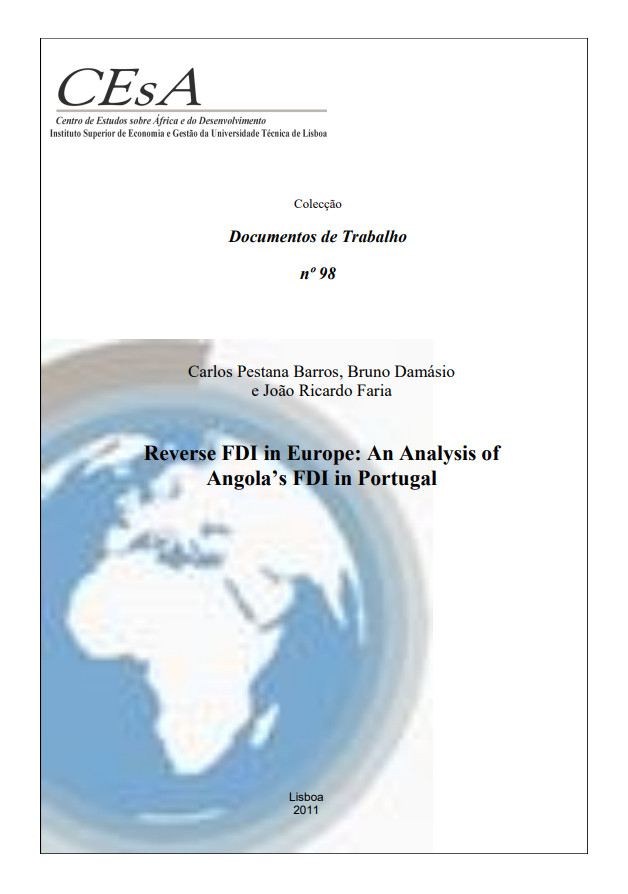
Working Paper 98/2011: Reverse FDI in Europe: an analysis of Angola’s FDI in Portugal
Abstract:
The literature on Foreign Direct Investment (FDI) is large and wide and has examined a number of diverse issues. Among them, to list a few, is the domestic capital stock, the economic growth, the employment protection, the exports, the knowledge capital, the location choice, multinational characteristics, productivity spillovers, the total factor productivity, and technology transfer. This text contributes to the literature by examining Angola’s FDI in Portugal. This is a new topic in the literature, since most studies focus on FDI flows from developed ountries to poor countries, either adopting a micro approach with company data or adopting a macro approach with national data. However, the analysis of FDI from former colonial African countries in the former colonial European ruler has not attracted attention so far. An open economy model with money laundering is proposed and then tested with a time series Bayesian regression. The result reveals that exports and corruption are the positive determinants of Angola FDI in Portugal. Policy implications are derived.
Quotation:
Barros, Carlos Pestana. Bruno Damásio e João Ricardo Faria. 2011. “Reverse FDI in Europe: an analysis of Angola’s FDI in Portugal”. Instituto Superior de Economia e Gestão. CEsA – Documentos de Trabalho nº 98/2011.
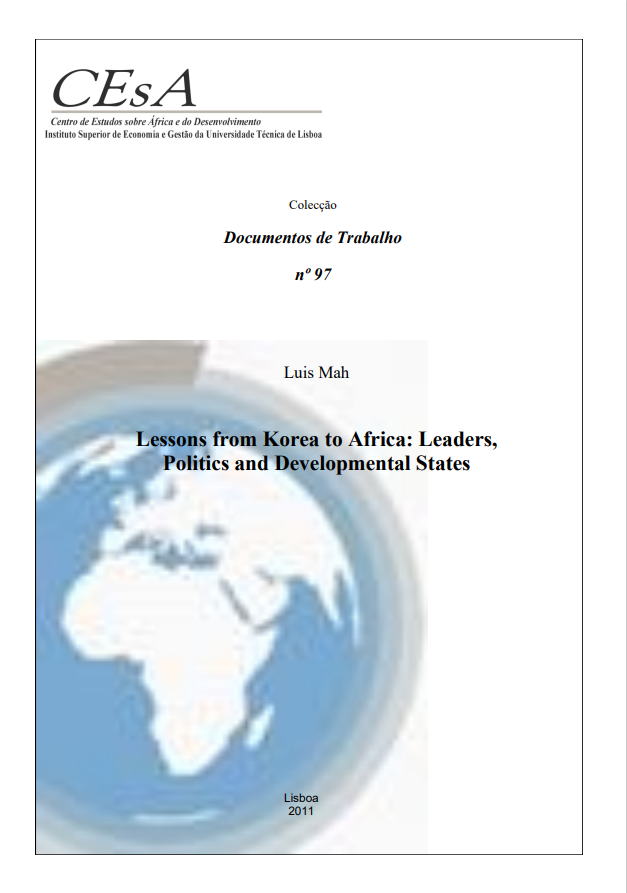
Working Paper 97/2011: Lessons from Korea to Africa: leaders, politics and developmental states
Abstract:
A recent series of studies have been dealing with the dynamics behind the building of developmental states in Africa. Lessons from Korea to Africa: leaders, politics and developmental states is a contribution for that debate by looking at the experience of the Korean developmental state and the lessons that Africa can learn from this Asian country’s experience seen as an outstanding model of economic development. Despite poor resource endowment and a large population, a colonial legacy, the devastation following a civil war, persistent political instability, and the lingering military confrontation with her northern neighbour, Korea’s role in the international economic system has rapidly increased in importance since the 1960s. For nearly five decades, Korea has achieved a remarkable economic performance that transformed the country from a typical case of a developing nation trapped in a “vicious circle of underdevelopment”, into one of the largest economies in the late 1990s. Beneath the economic success lied a system of “socialisation of private risk”, a particular mode of organising the market, as the “visible hand” of a strong, bureaucratic and developmental state were able to accelerate the pace of economic growth by identifying strategic industrial sectors, making discretionary allocation of resources to those sectors, and minimising the collective action dilemmas pervasive in most developing countries. But the Korean state, as any other state, is a political realm that encompasses distinct, contending and at times colliding actors. In fact, the Korean developmental state provides us clues about the role that leadership play and what stands at the “heart of a politics of economic growth”. Policy choices and implementation rest on the strategies designed by the rulers to boost their political legitimacy, to strengthen their power, and to guarantee regime survival. Strategies are not only a product of institutional opportunities and constraints, but also of history, context, coalition politics and ideological templates involving the actors at the time of action. This paper will discuss the role played by President Park Chung-Hee (1961-1979) in building a bureaucratic-developmental state and what African countries can learn from these leadership experiences in terms of its own development path.
Quotation:
Mah, Luís. 2011. “Lessons from Korea to Africa: leaders, politics and developmental states”. Instituto Superior de Economia e Gestão. CEsA – Documentos de Trabalho nº 97/2011.
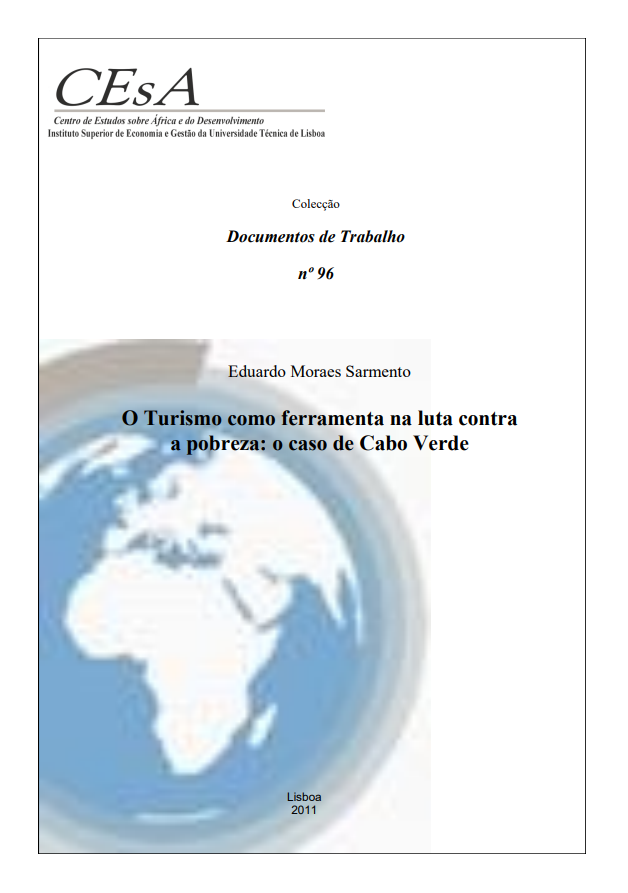
Working Paper 96/2011: O turismo como ferramenta na luta contra a pobreza: o caso de Cabo Verde
Abstract:
The poverty line necessarily varies from country to country. In some regions of the world, well-being is attained when the amount of food and clothing is sufficient for full social integration. However, in more industrialised societies, the level of demand will be higher. Thus, in some cases, it may be concluded that integration will depend on the culture, the region and even the period that is being experienced (Sen, 1983), it being certain that this phenomenon will cease to be local and become global as a corollary of the globalisation process. In this context, it is important to stress that any approach taken will always be subjective in nature and it will always be very difficult to adequately characterise which goods and services are really fundamental in order to stipulate a certain level of poverty, exclusion or even deprivation. This article aims to reflect on the drama that plagues many of today’s societies: poverty. This is a phenomenon which must be eradicated quickly. O turismo como ferramenta na luta contra a pobreza: o caso de Cabo Verde intends to reflect on the drama that plagues many of today’s societies: poverty. This is a phenomenon that needs to be eradicated quickly. The article has two main parts. In a first phase, its causes and the different forms of manifestation are analyzed. In a second phase, we intend to analyze in more detail how tourism can be used as an alternative way to reverse or minimize this calamity.
Quotation:
Sarmento, Eduardo Moraes. 2011. “O turismo como ferramenta na luta contra a pobreza: o caso de Cabo Verde”. Instituto Superior de Economia e Gestão. CEsA – Documentos de Trabalho nº 96/2011.
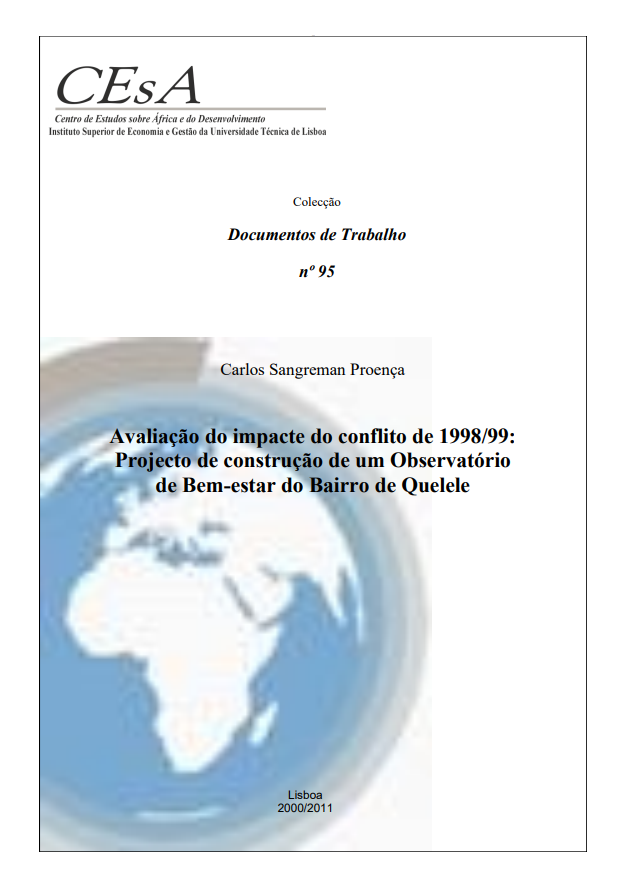
Working Paper 95/2000-2011: Avaliação do impacte do conflito de 1998/99: projeto de construção de um observatório de bem-estar do bairro de Quelele
Abstract:
For an analysis of the well-being of populations, we consider it essential to have a clear notion of the concept of State, and of the specific characteristics that it assumes in a country like Guinea-Bissau. Institutions with continuous functioning of qualified personnel and adequate funding, appear in States with a more mature process of organization, and therefore in a State under construction, the decisions on economic and social policy taken by the Government are carried out by institutions in an imperfect way and in accordance with with the degree of development of those who have responsibilities in each area. The result is a slow and difficult transition to the implementation of decisions by the Government or autarchies, creating disillusionment in the populations that expect an increase in the level of well-being provided by these institutions. BAYART (1989), when defining the State in most sub-Saharan African countries, considers a notion of authority that designates the set of institutions involving any position of power that allows the accumulation of capital, through the private appropriation of resources of different types, such as the military, diplomatic, cultural, technological and educational, in addition to the economic ones, whether within the current legislation, whether in predatory actions or charging commissions for decisions of institutional responsibility. Its separation from civil society is unclear, in the sense that individuals in positions of authority seek to appropriate resources for themselves and their social support group in the same way, whether or not they are in these institutional positions. In other words, we adopt, with this interpretation, Bayart’s concept of “overlay” for the State/Civil Society dichotomy, where this author defends the idea that such categories are not very clearly distinguished, nor are they of interest for the understanding of African societies. the consideration of an artificially defined distinction, which makes one forget the “depth of the historical field”. It seems to us that this overlap exists in Guinea-Bissau due to the weakness of the institutions mentioned above. It is the existence of this overlap that leads to greater importance in the strategies of populations pursued outside the state framework. In other words, the less the State, the more weight the actions of civil society have. The Welfare assessment and therefore the methodology for building an Observatory that allows us to monitor the evolution of Welfare in the neighborhoods has a theoretical framework that starts from the idea that it is fundamental to determine what would happen if there had not been concrete actions to improve the Welfare. Be. It is thus intended to operationalize the notion of multidimensional Welfare / Poverty, bringing together resources of individual consumption, such as food, of social use (or appropriation), such as those of ethnic or religious origin, and even resources of institutional origin, or participation in the political life of the community. It should be noted that the definition of the components of the EBP is very subjective, no matter how much recourse it makes to the existing literature. The surveys carried out in Europe that sought to determine these components gave very unreliable results either in the elements or in their hierarchy (Hagenaars, 1986). In Africa, participatory methods have not yet managed to generate a definition of generalizable BE standards, although the recent Voices of the Poor, financed by the World Bank, is a significant advance in this direction. What you want to detect is change, for better or worse, and not a static situation. For example, in the housing component, what is sought to be measured, in Avaliação do impacte do conflito de 1998/99 : projeto de construção de um observatório de bem-estar do bairro de Quelele, is whether housing conditions have improved or worsened.
Quotation:
Sangreman, Carlos. 2011. “Avaliação do impacte do conflito de 1998/99 : projeto de construção de um observatório de bem-estar do bairro de Quelele”. Instituto Superior de Economia e Gestão. CEsA – Documentos de Trabalho nº 95/2000-2011.
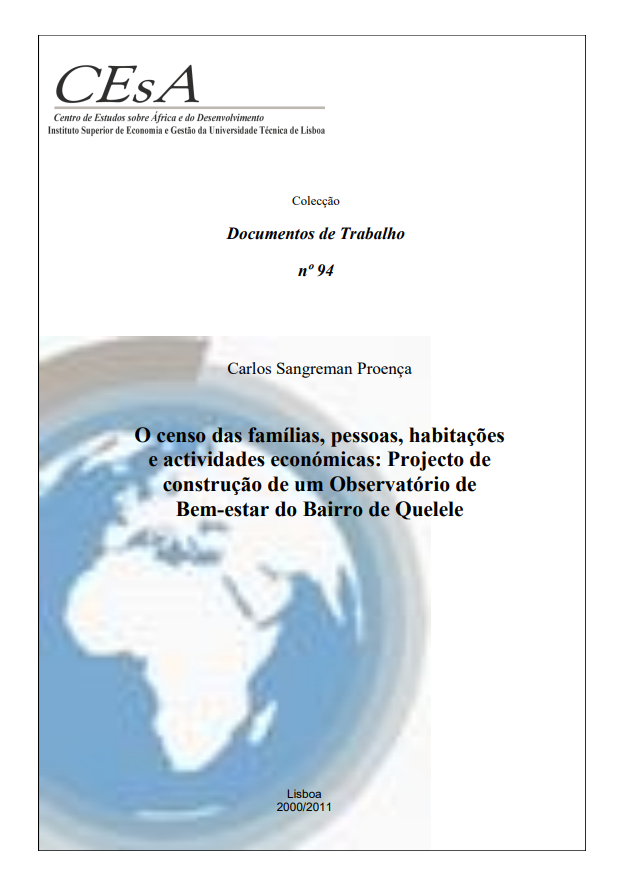
Working Paper 94/2011: O censo das famílias, pessoas, habitações e actividades económicas: projecto de construção de um Observatório de Bem-estar do Bairro de Quelele
Abstract:
O censo das famílias, pessoas, habitações e actividades económicas: projecto de construção de um Observatório de Bem-estar do Bairro de Quelele was carried out in pursuit of the objective of reinforcing the capacity of the living forces (today we would say “the agents”) of civil society in the Quelele neighborhood to intervene in order to achieve an increasingly better life, a level of higher welfare for the inhabitants. The theoretical basis is summarized in the book to be published in April by the OECD Development Assistance Committee (DAC), “DAC Guidelines on Poverty Reduction”, which starts from the multidimensional notion of well-being for a definition of poverty as deprivation of part of the or all of these dimensions. The author also assumes an active attitude towards the applied research outlined here. In other words, it does not consider itself as an external observer of a collective identity in formation, but rather as a small part of the express action of the various formal and informal institutions in the neighborhood so that this identity develops and asserts itself more and more clearly. This work would not have been possible without the work of the surveyors from the Quelele neighbourhood, who kept the bulletins they had already filled out throughout the period of the armed conflict, and used their knowledge of the terrain to carry out the survey in a very short period of time. Likewise, AD’s IT staff learned to work with the statistical information program with ease, a sign that the country’s human resources have evolved significantly. Thanks are all due to the people of AD, from its directors to the simplest members, as well as to Pedro Lonet Proença, who made available the photographs he took in the neighborhood, and to Cristina Duarte, who executed the panels for the exhibition to return the results enthusiastically and creatively.
Quotation:
Sangreman, Carlos. 2011. “O censo das famílias, pessoas, habitações e actividades económicas: projecto de construção de um Observatório de Bem-estar do Bairro de Quelele”. Instituto Superior de Economia e Gestão – CEsA Documentos de trabalho nº 94-2011.
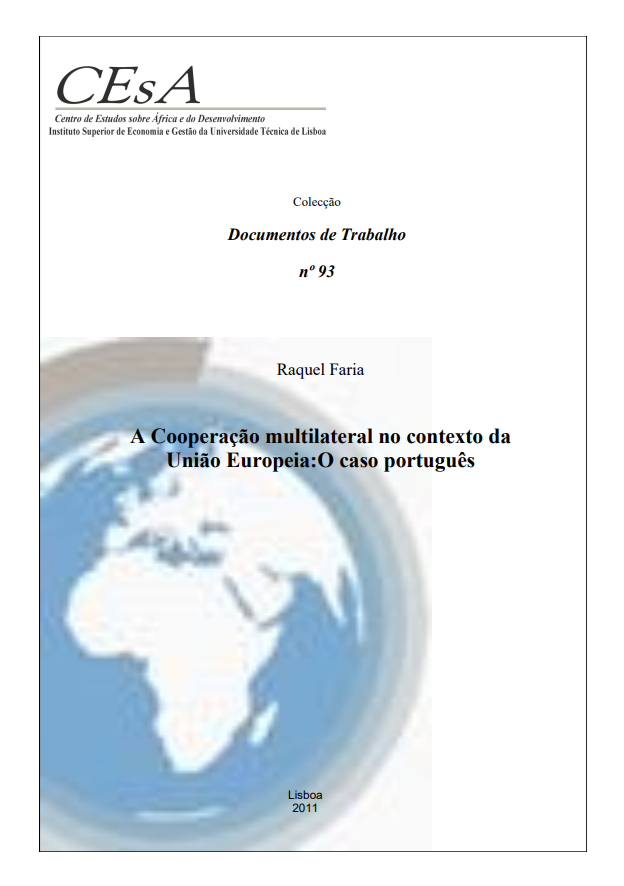
Working Paper 93/2011: A cooperação multilateral no contexto da União Europeia: o caso português
Abstract:
Over more than six decades, underdevelopment (situations of extreme poverty, the lack of basic sanitation networks, difficult access to drinking water and foodstuffs, …) has been one of the major concerns of the international community, more precisely of the European community. In fact, with the end of the Second World War, with the independence of many former colonies, the underdevelopment that characterized them became a target of great concern on the part of the most developed countries, not only from an economic point of view, but also from a political and social point of view. Although, at times, overlapped by other priorities and concerns, what is certain is that in this period there were already signs of fostering a joint will towards Development Cooperation. These signs grew, taking on particular importance in the mid-twentieth century, with the Treaty of Rome in 1957 and, later, with the conventions of Yaoundé I and II in 1963 and 1969, respectively. However, and as a result of the international political and economic context, it was in the 1970s (70s) that there was talk of a policy of Development Cooperation with the European Community. The objective was to develop a cooperation policy that could be applied to any and all countries, regardless of their characteristics. The idea of global cooperation, in the broadest sense of the word, then arises, which with some changes, largely as a result of evolution and even the phenomenon of globalization that has been witnessed in recent years, has perpetuated to the present day. It is within a framework of International Development Cooperation, based on the principles defended by the European Union’s development policy (good governance; promotion of human rights; promotion of fair, equitable and lasting development; respect for the rule of law and democratic policies; elimination of extreme poverty, …) that the Portuguese Cooperation policy is part of. Indeed, the national cooperation policy, regardless of the type of cooperation it assumes (bilateral, decentralized or multilateral), shares the same purposes as the European Union, in defining lines of action that ultimately aim at peace, the spirit of solidarity among peoples, the establishment and consolidation of a democratic political regime in all countries, irrespective of their culture, religion or ethnicity. It seeks, above all, respect for human rights in any circumstance, as well as the promotion of the Portuguese language and the protection of the environment, which is increasingly despised by Man. It is therefore concluded in A cooperação multilateral no contexto da União Europeia: o caso português that, despite the possibility of Portugal participating in the process of defining and deciding on strategies, the “(…) EU constitutes an institutional political framework to which we are bound and whose decisions and legislative process influence the performance of Portuguese cooperation in a special way, simultaneously constituting the space that allows us to disseminate and project within it the values and principles that animate Portuguese cooperation, as well as those of our development partners. It is also through the EU that these values can be taken to broader spaces than those that bilateral cooperation would allow us (…)” (Portuguese Strategy for Multilateral Cooperation, document of the Portuguese Institute for Development Support).
Quotation:
Faria, Raquel. 2011. “A cooperação multilateral no contexto da União Europeia: o caso português”. Instituto Superior de Economia e Gestão. CEsA – Documentos de Trabalho nº 93/2011.
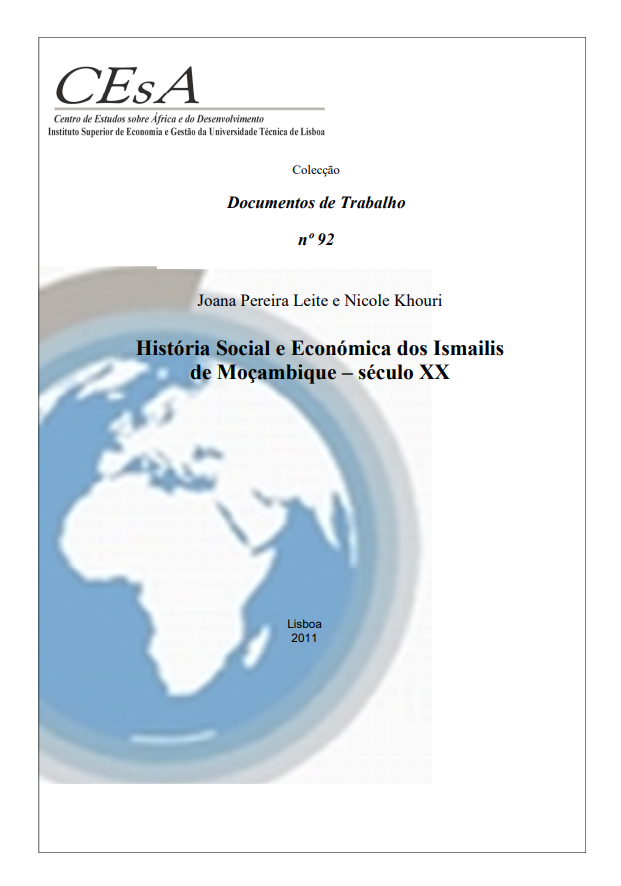
Working Paper 92/2011: História social e económica dos ismailis de Moçambique – Século XX
Abstract:
Recent historiography on the Indian presence in Mozambique and in the territories of Eastern and Central East Africa is unanimous in highlighting its commercial vocation in the context of the colonial occupation of the 19th and 20th centuries. In the case of Mozambique, the documentary sources available from the time of Portuguese colonisation attest to its importance both in the rural world, ensuring the monetisation of African agricultural produce, essential for the maintenance of the colonial export economy, and in the dynamisation of an important segment of retail trade in an urban context, aimed at a broad and heterogeneous spectrum of consumers who structured the domestic market in colonial times. The analyses inspired by such sources favour a macro-historical focus on the action and spatial inscription of these economic agents and rarely take into account the heterogeneous nature of the Indian communities in the Mozambican context, from the religious and socio-economic point of view. This invisibility concerns their own economic practices, the processes leading to their integration into colonial society, and also conceals the nature of the relations existing within them or resulting from their interaction with African societies, European economic agents and the colonial administration. This highlights the need to construct a new history of colonisation based on the testimony of the members of the different Indian communities originating in Mozambique, allowing the reductionist vision of the holistic perceptions consecrated by the economic historiography of colonisation to be broadened and enriched, on the basis of the sole recourse to written sources. It was the intention to respond to this challenge that led us to make the História social e económica dos ismailis de Moçambique – Século XX and collect memory narratives from members of the Indian Ismaili community present in Mozambique during the colonial period of the Estado Novo (1930-74).
Quotation:
Leite, Joana Pereira e Nicole Khouri. 2011. “História social e económica dos ismailis de Moçambique – Século XX”. Instituto Superior de Economia e Gestão – CEsA Documentos de Trabalho nº 92-2011.
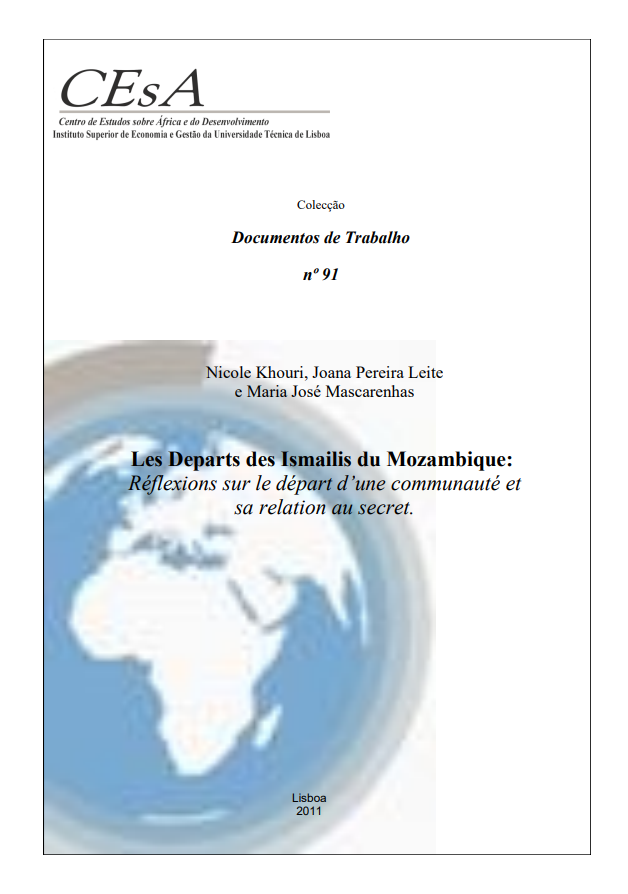
Working Paper 91/2011: Les départs des Ismailis du Mozambique: Réflexions sur le départ d’une communauté et sa relation au secret
Abstract:
When asked about their relations with the different groups that constituted colonial Mozambican society during the last decades of Portuguese colonisation, members of the Ismaili community spoke of their departure, which occurred between 1973 and 1976, as part of a ‘natural’ split that ended their settlement in the colony for two or three generations. Talking about a collective and organised departure proved to be a very delicate task, as if the attributes of this event referred to something forbidden or difficult to say to outsiders, in this case researchers. The question of the collective departure of an entire community initially opened the door to many interpretations linked to the immediate history of this event. It should be noted that, first of all, the mobilisation for a collective departure of the Ismaili community before April 1974 could have greatly upset the Portuguese colonial regime, which still did not believe that it would end in Mozambique. The organisation of this departure as a collective fact gave it the sign of the irreversibility of a time and the death knell of the colonial order. Did the Ismaili community betray the government of the colony by taking this step even before the fall of the colonial regime? Had not their leader, the Aga Khan III, assured the Salazar government of his community’s loyalty to the direction of Portuguese policy? Seen from the Mozambican side, would the collective departure have betrayed the African populations on whose land this community had flourished? Had it also betrayed the white Mozambicans who had stayed and thus made a different choice? That he had made a different choice? Needless to say, for Frelimo, leaving obviously meant betraying the ideals of the independence struggle. Les départs des Ismailis du Mozambique: Réflexions sur le départ d’une communauté et sa relation au secret aims to relate the collective and organised departure of the Ismaili community from Mozambique between January 1973 and December 1976, a central element of secrecy, to its various manifestations in the accounts of the departures of its own members.
Quotation:
Khouri, Nicole, Joana Pereira Leite e Maria José Mascarenhas. 2011. “Les départs des Ismailis du Mozambique: Réflexions sur le départ d’une communauté et sa relation au secret”. Instituto Superior de Economia e Gestão. CEsA – Documentos de Trabalho nº 91/2011.
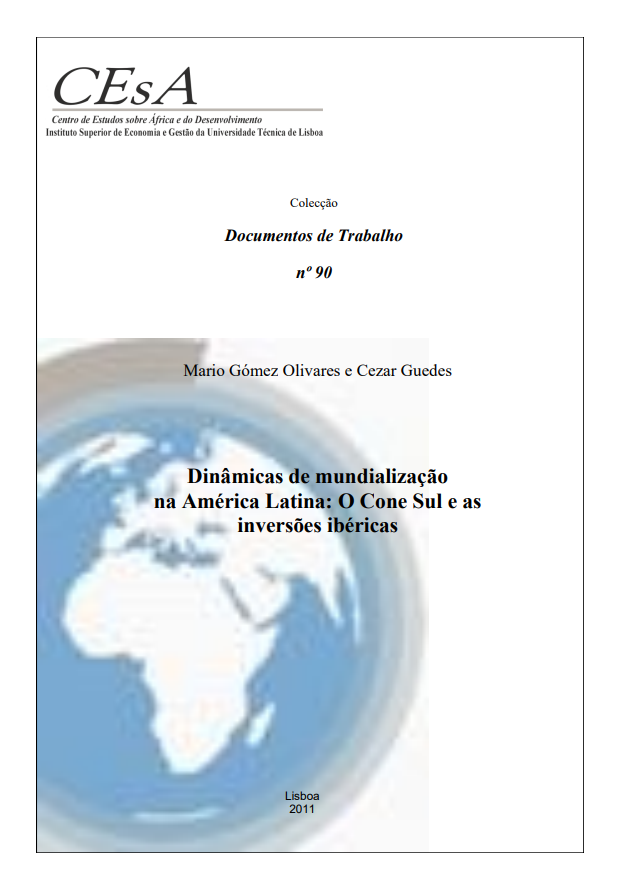
Working Paper 90/2011: Dinâmicas de mundialização na América Latina: o Cone Sul e as inversões ibéricas
Abstract:
Dinâmicas de mundialização na América Latina: o Cone Sul e as inversões ibéricas has the objective of analyzing in perspective the integration processes that Latin America has gone through, particularly the Southern Cone, in the long process of formation of the world economy since the expansion that incorporated the American continent to the capitalist development until the beginning of the XXI century. The emphasis is placed on the eighties of the last century, when another form of integration began, marked by commercial and financial openness, as well as by a growing integration of markets accompanied by the formation of economic blocs at global and regional level. The spatial logics and relations of the Southern Cone as a destination for foreign direct investment (FDI) originating in Spain and Portugal will be discussed in greater detail. This is an aspect that we highlight: from the point of view of the impact of investments, the Southern Cone is seen as an Iberian reality rather than a European or exclusively American one, as it was until the early 1990s. In other words, we underline the particularity of the Iberian option for a selective strategy of internationalization of its companies, leaving the traditional logic behind when moving towards a peripheral space outside the circuits of the Triad (USA, Japan and the European Union); on the contrary, and differently from the other European countries, enabling a path of integration which is what results from the internationalization of companies and the economy in the global space.
Quotation:
Gómez Olivares, Mario e Cezar Guedes. 2011. “Dinâmicas de mundialização na América Latina: o Cone Sul e as inversões ibéricas”. Instituto Superior de Economia e Gestão .CEsA – Documentos de Trabalho nº 90/2011
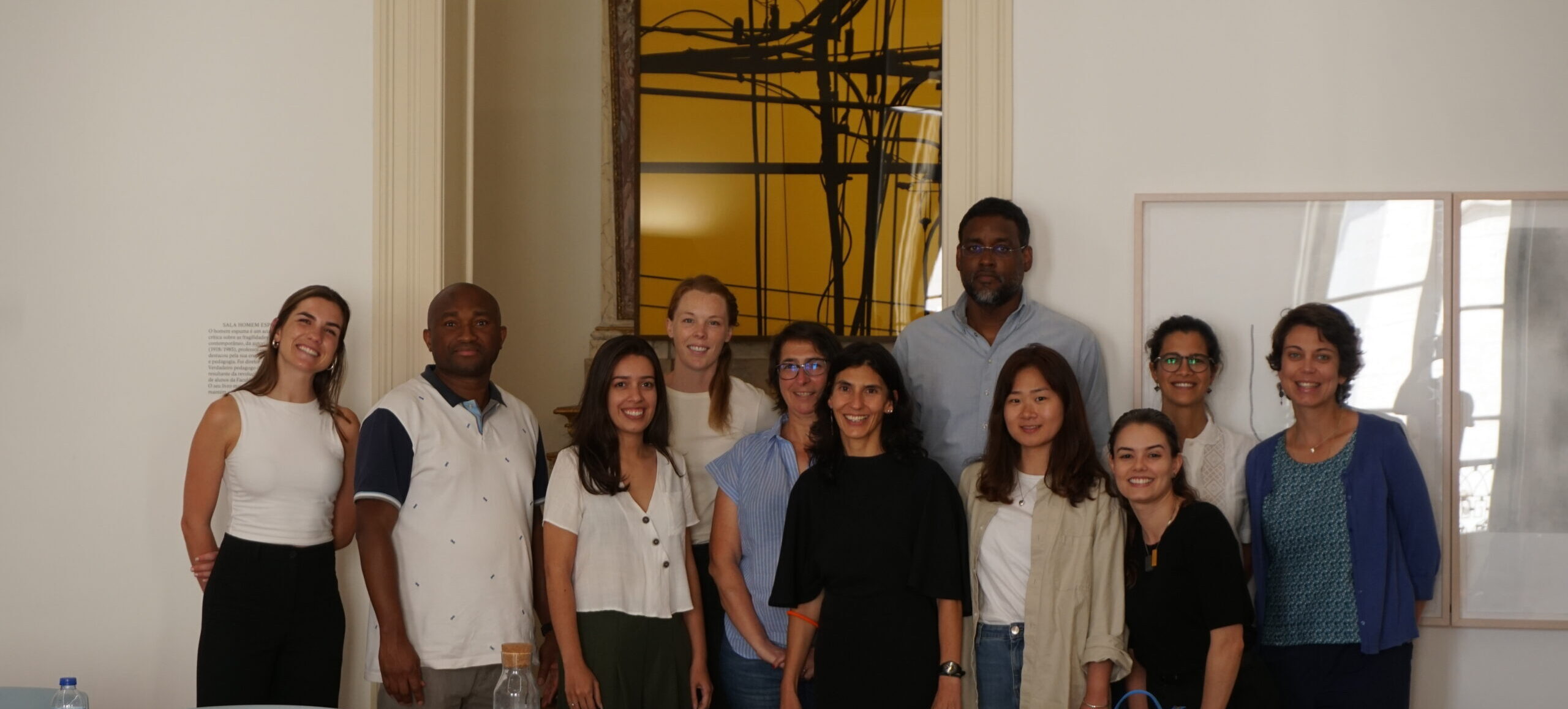
PhD students in Development Studies and CEsA researchers improve writing good practices in a healthy academic writing retreat
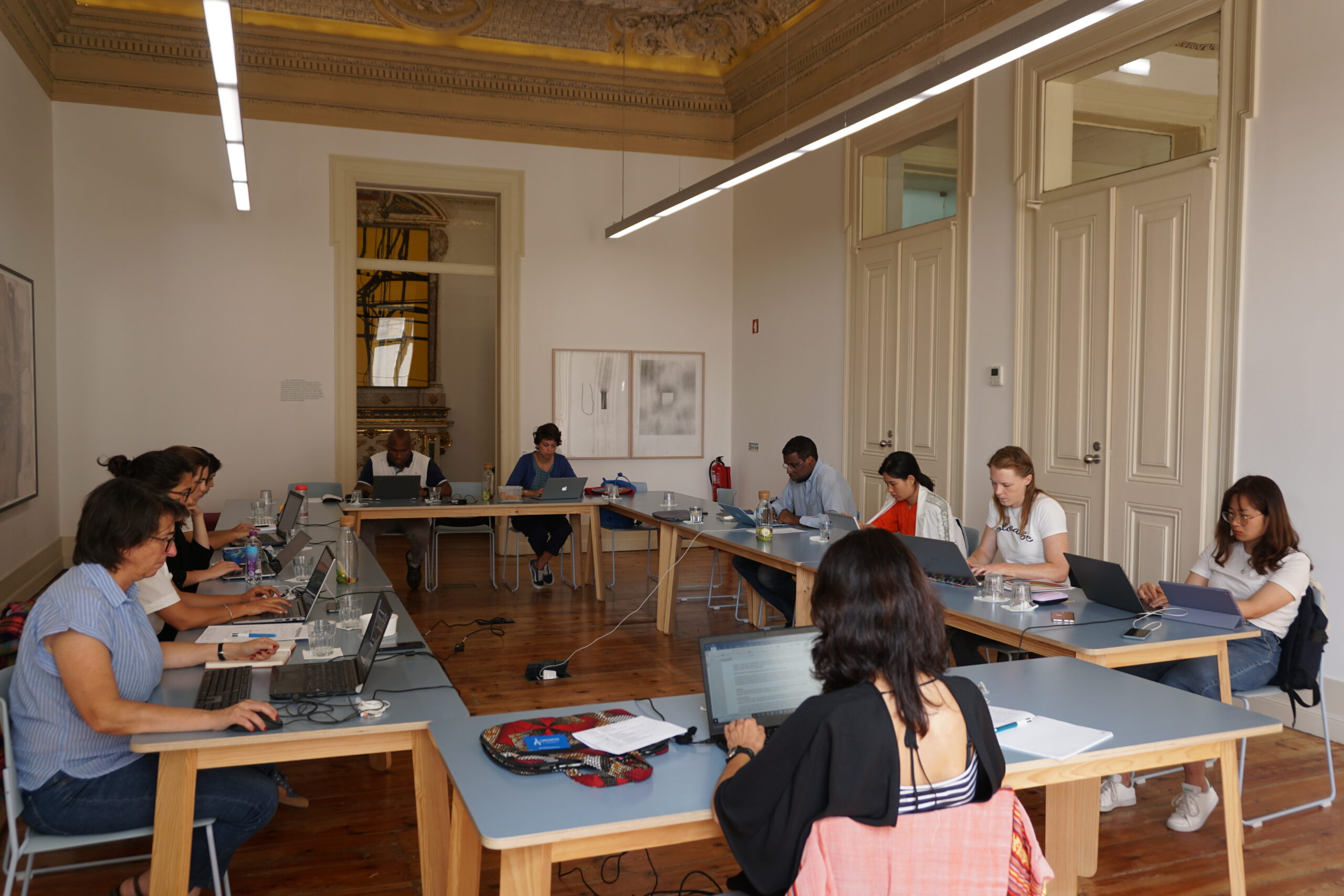
PhD students from the Program in Development Studies (PDED) (ISEG/ICS/IGOT/ISA) and CEsA and ISEG researchers gathered on June 22 and 23, 2022 for the Healthy Academic Writing Retreat. The workshop was facilitated by Dr Joana Pais Zózimo (Lancaster University Management School) at Brotéria and was supported by CEsA.
The two days of intense learning were dedicated to the Structured Writing Retreat (SWR) methodology, developed by Professor Rowena Murray (University of the West of Scotland), and brought to Portugal by Dr Joana Pais Zózimo. This method provides the time, space and structure necessary for participants to progress on projects of academic writing, and to which Joana added the health and wellness aspect.
Joana Pais Zózimo explains that the differential of the SWR is the healthy and joyful approach, a distraction-free and supportive writing space. “The ample, focused writing time is supported by movement and meal breaks and opportunities to discuss your writing with the community of writers,” says Zózimo. Some specific learning outcomes were: improving attitude towards writing practice, increasing confidence in tackling academic challenges and reinterpreting significant amounts of writing to produce realistic outcomes (goal setting), decreasing stress and anxiety levels, and providing advanced outlook into their academic achievements (by replicating the method), in addition to establishing strong collaborative connections within the writer’s group and across other peers/faculties.
Healthy Academic Writing Retreat Testimonials
Silvia Amaral, 2nd year PhD student in Development Studies (ISEG/ICS/IGOT/ISA)
The healthy Academic Writing Retreat was a new experience for me. It was the first time that i joined a group to write, and to write in a structured way. Although i have a strong self discipline for work, i have learnt how to do it in a more healthy, and therefore effective, way. The structured slots of 60 minutes uninterrupted writing went by really fast. It is, simoultaneously, long enough to get a good flow of writing, but not too long to get tired or bored. And if you raise your head above your work, you will see your colleagues focused working and that will give you extra motivation to continue. The 20 minutes breaks in between the writing slots help to rest the brain and relax the spirit, with the opportunity to chat with the colleagues about the work or any other topic.
The place where the workshop took place – an historical building in the centre of Lisboa – also contributed to its sucess. We work better in a nice place with lots of natural ligtht, good ventilation, surrounded by beautiful decoration and in good company of motivated collegues. Overall it was a very good experience, also thanks to the calm and organized leading of the convenor, and it had a very positive impact in my production, not only during those two days but also for the way i will organize my work from now on. Thanks CEsA for organizing this!
Cosmas A. BA-ANA-ITENEBE, 2nd year PhD student in Development Studies (ISEG/ICS/IGOT/ISA)
I found the writing retreat to be very enriching and focus driven. The methodology was quite unique and innovative, that it really gets you to focus and write. The fact that you are also in company of others that are also focused on writing really propels you to write and get engaged. The short breaks and healthy snacking was truly amazing. I also think the venue chosen for the retreat was great. The fact that other people come there to study added more flavor to the retreat and got you into the study mode. The fact that facilitator was not just a facilitator but also participated in the writing as well as sharing her experience was unique and amazing.
However, for me, I thought I would be learning how to actually write and not just coming to write. I think the facilitators and organizers need to help participants prepare in advance such as doing some initial research on what ever they would be writing about than just arrive and then write.
Xin Su, 1st year PhD student in Development Studies (ISEG/ICS/IGOT/ISA)
At the Healthy Academic Workshop we wrote together, set concrete writing goals, and devote ourselves to writing, which has helped me a lot. The atmosphere of the workshop is also very relaxed and pleasant, and the professor is very kind and took care of each student’s progress. It was also a very enjoyable experience to talk with my classmates between writing sessions and at lunch.
Joana Pais Zózimo’s tips for a healthy academic writing
Writing goals:
- Have a clear idea of the writing project you want to work on.
- Outline a basic plan (perhaps draft an end goal/outcome) for the planned writing sessions; if you’re not sure what you want to achieve, spend about 20-30 minutes doing some free writing or mind mapping.
- Complete relevant reading and make notes.
- Download all necessary materials to your computer to avoid unnecessary visits to the internet.
Welness goals:
- Do what you can to secure a comfortable and distraction-free environment:
- Make sure others know when you’re busy and when you’re on breaks.
- Plan/have nutritious and nourishing healthy light snacks and drinks so you can enjoy them during the retreat. Avoid food that is too heavy, rich, or sweet.
- There is a snack back at the venue where you can buy coffee, tea and food.
For further information, please contact: zozimojoana@gmail.com (email), 962392825 or +447578609287 (Whatsapp).
Author and images: CEsA Communications team (comunicacao@cesa.iseg.ulisboa.pt)





